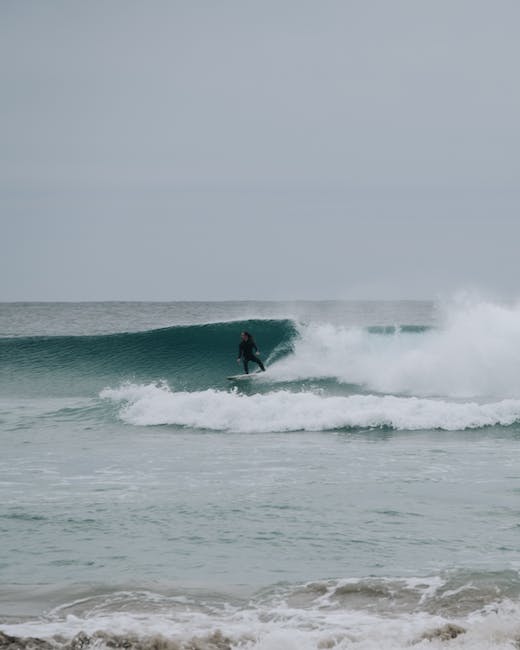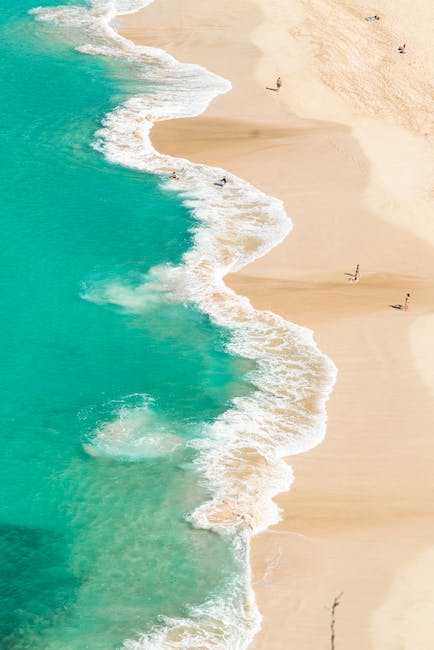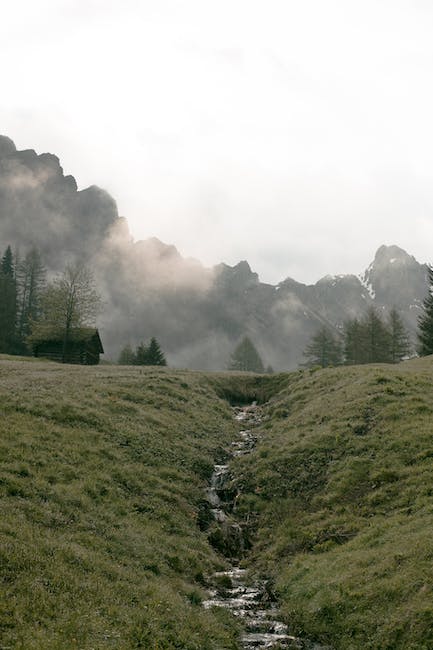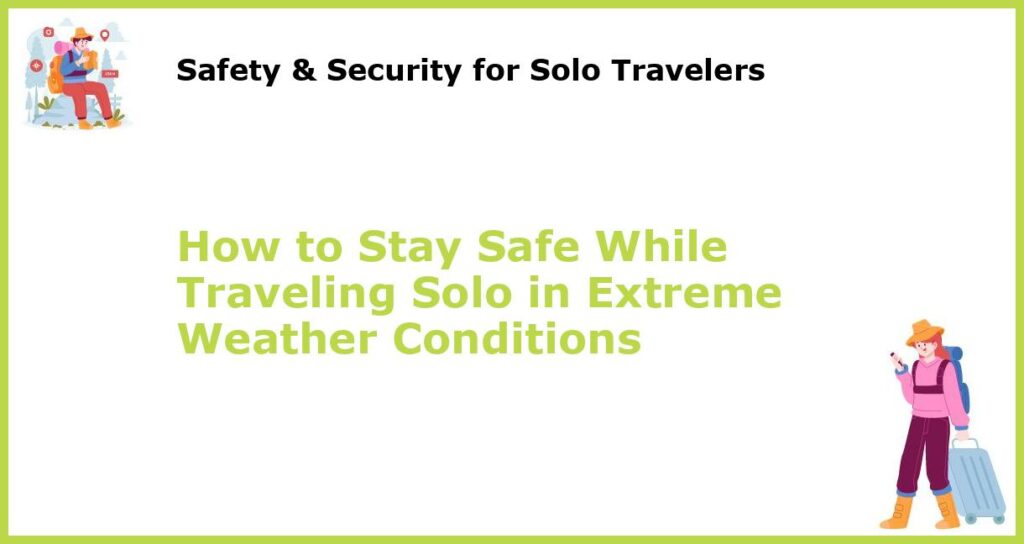Are you a solo traveler? Do you prefer to take on extreme weather conditions during your adventures? If yes, then it is crucial that you are prepared for what may come your way during your trip. These weather conditions can pose a serious risk to your safety and can lead to life-threatening situations. To help you stay safe, we’ve put together some tips on how to stay protected when traveling solo in extreme weather conditions.
Check Weather Forecasts Regularly

The first thing you should do before embarking on any solo travel adventure is to check weather forecasts for the area you will be traveling. It is important to stay updated on both local and national weather services to ensure you are prepared for any extreme weather conditions that may arise. By keeping yourself informed, you are able to make informed decisions and prepare accordingly.
For instance, if you are traveling to an area with extreme heatwaves, then it is essential to plan your activities earlier in the day or later in the evening when temperatures have cooled. Heatwaves in extreme conditions can lead to dehydration or worse, heatstroke. In addition, if you are traveling to an area with severe storms or heavy snowfall, you should investigate the level of dangers present and take the necessary precautions to avoid any potential harm.
Stay Hydrated in Hot Weather Conditions

In areas with hot or humid weather conditions, staying hydrated is essential for your safety. Drinking plenty of water or other hydrating fluids is necessary to help keep you healthy while you explore. Additionally, it’s important to avoid alcoholic beverages and caffeine as they can dehydrate your body quickly increasing the risk of heatstroke. Hydration will help you avoid headaches, nausea, and dizziness; which may distract you from enjoying your adventure.
Additionally, you need to prepare your body for the weather conditions. This means wearing breathable, comfortable clothing, such as light-colored cotton fabrics that will allow your skin to breath. In warmer moments of the day, make use of sunhats, scarfs or light jackets to shield you from the sun’s harmful ultraviolet rays.
Carry Appropriate Clothing and Gear

Packing appropriate clothing and gear can make all the difference in staying safe while traveling solo in extreme weather conditions. It is vital to dress appropriately for any particular weather condition. If you are visiting an area with heavy snow, pack warm clothing and boots, which will provide good traction on slippery surfaces. Moreover, if you are traveling to a rainy region, make sure to bring waterproof clothing and boots. This weather is known to cause road blockages, flood and sometimes power outages. In either instance, you should have adequate clothing and other supplies that will allow you to be comfortable, and if your travel plans change or you become stranded.
Avoid Outdoor Activities in Severe Weather

During severe weather conditions, it is important to avoid activities that might put you in danger. This includes activities such as hiking, skiing, or any other outdoor activity that may put you at risk of getting trapped or injured by extreme weather. It is best to wait out the weather until it subsides and conditions are safe enough to travel again.
It is also important to consider the weather when planning your activities in a new location so that you can make safe choices. Get weather alerts through various apps, websites or social media feeds to avoid sudden weather changes that may disrupt your plans.
Research Emergency Services in the Region

No matter where you’re traveling, make sure to research emergency services in the region beforehand. This will ensure that help is available readily in the event of an emergency. Ensure that you are familiar with the emergency phone numbers in the area and have spare phone batteries or chargers to ensure your device stays powered. It is also a good idea to know the location of the nearest hospital or medical facility.
Moreover, you should educate yourself on the emergency protocols and procedures in the case of natural disasters or severe weather events in the region. Remember, the key to staying safe in severe weather conditions is preparing for any situation that may arise.
Inquire About Hotel Evacuation Procedures

If you’re staying in a hotel, it is crucial to inquire about evacuation procedures in case of emergency weather conditions. You should know where the emergency exits are located and any procedures in place for natural disasters or severe weather events. It is essential to follow any instructions given by hotel staff in case of emergency to avoid potential risks.
Stay Alert for Signs of Hypothermia or Hyperthermia

If you’re traveling to an area with extreme weather conditions, stay alert for signs of hypothermia or hyperthermia. In colder regions, signs of hypothermia include shivering, confusion, and difficulty speaking, while signs of hyperthermia include dehydration, rapid heart rate, and fatigue. Recognizing the symptoms early could be the difference between a quick recovery and a potential disaster. Seek medical attention immediately if you experience any of these symptoms.
Be Prepared for Power Outages

In regions with severe weather conditions, power outages can be common. It is important to travel with essentials such as flashlights, extra batteries, and a portable charger to ensure that you can stay connected and make emergency calls if needed. You should also have adequate drinking water, food, and first aid supplies, as you may not have access to basic resources such as power, during an emergency. It is best to be prepared and plan ahead of time.
Stay Cautious During Thunderstorms

Thunderstorms can be dangerous, especially in areas with a high risk of lightning. If you are caught in a thunderstorm, it is important to avoid large trees, lakes, and other bodies of water. Take shelter in a building or car, and wait for the storm to pass before venturing outside again. It’s essential to pay attention to any updates or warnings from local weather services to stay informed and make the most appropriate choices.
Keep Your Family and Friends Informed

Finally, it’s crucial to keep your family and friends informed about your travel plans, including your destination and expected arrival times. Send regular updates as you travel, and notify them immediately if you experience any emergency weather conditions or other unexpected events. This will ensure that they are aware of your situation, and will be able to contact relevant emergency services if necessary.
Safety is always a priority when traveling, particularly when you are the only person on your trip. It is important to make sure you are prepared for any extreme weather conditions, have researched emergency services and informed your family and friends of your travel plan. Making necessary arrangements before embarking on your journey will keep you protected and can also give you peace of mind while on your adventure.








 You might also be interested in those articles related to solo traveling
You might also be interested in those articles related to solo traveling